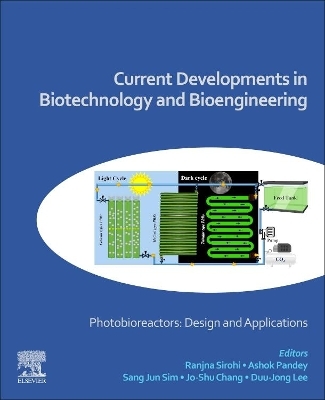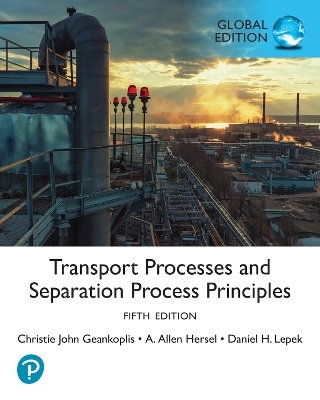
Current Developments in Biotechnology and Bioengineering
Elsevier - Health Sciences Division (Verlag)
978-0-323-99911-3 (ISBN)
Dr. Ranjna Sirohi is currently working as Research Professor in Korea University, Seoul. She obtained B.Tech. degree in Biochemical Engineering and M.Tech. degree in Agricultural Engineering with specialization in Food Biotechnology Engineering. She has worked as Visiting Researcher at the École Polytechnique Fédérale de Lausanne, Switzerland, as Scientist at Centre for Energy and Environment Sustainability, Lucknow and as Senior Project Associate at CSIR-NEERI, Nagpur. She obtained her Ph.D. degree in Process and Food Engineering from G.B. Pant University of Agriculture and Technology, Pantnagar, Uttarakhand. Her major research interests are in the field of Bioprocess Technology - Food & Food Waste Valorisation-Waste to Wealth – Biofuels. She has 65 publications/communications that include 32 research and review papers, 12 book chapters, 7 popular articles and 14 conference proceedings. Dr Sirohi has won several awards and honors that include Research Excellent Award in the international conference on New Horizons in Biotechnology, Trivandrum, India (2019), Best Poster award in 8th International Forum on Industrial Bioprocessing (IBA-IFIBiop 2019), Miri; Sarawak, Malaysia (2019) and Research Excellence Award in International Conference on Bio-Innovation for Environmental and Health Sustainable Developments (BEHSD-2018), Lucknow, India (2018). She is the Life member of Indian Society of Agricultural Engineers (ISAE); the Biotech Research Society, India (BRSI); Indian Science Congress Association (ISCA) and Association of Food Scientists & Technologists, India (AFSTI). Professor Ashok Pandey is currently Distinguished Scientist at the Centre for Innovation and Translational Research, CSIR-Indian Institute of Toxicology Research, Lucknow, India and Executive Director (Honorary) at the Centre for Energy and Environmental Sustainability – India. Formerly, he was Eminent Scientist at the Center of Innovative and Applied Bioprocessing, Mohali and Chief Scientist & Head of Biotechnology Division and Centre for Biofuels at CSIR’s National Institute for Interdisciplinary Science and Technology, Trivandrum. His major research and technological development interests are industrial & environmental biotechnology and energy biosciences, focusing on biomass to biofuels & chemicals, waste to wealth & energy, industrial enzymes, etc. Professor Pandey is Adjunct/Visiting Professor/Scientist in universities in France, Brazil, Canada, China, Korea, South Africa, and Switzerland and also in several universities in India. He has ~1425 publications/communications, which include 16 patents, 90 books, >700 papers and book chapters, etc with h index of 105 and ~49,000 citations (Goggle scholar). He has transferred several technologies to industries and has done industrial consultancy for about a dozen projects for Indian/international industries. Professor Pandey is the recipient of many national and international awards and honours, which include Highest Cited Researcher (Top 1% in the world), Clarivate Analytics, Web of Science (2020, 2019 & 2018); Top scientist in Biotechnology (#1 in India and #8 in the world), Stanford University world ranking (2020); Fellow, World Society of Sustainable Energy Technologies?(2020); Fellow, Indian Chemical Society (2020); Distinguished Scientist, VDGOOD Professional Association, India (2020); Distinguished Professor of Eminence with global impact in the area of Biotechnology, Precious Cornerstone University, Nigeria (2020); IconSWM Life-time Achievement Award 2019, International Society for Solid Waste Management, KIIT, Bhubaneshwar, India (2019); Yonsei Outstanding Scholar, Yonsei University, Seoul, Korea (2019); Life-Time Achievement Award from the Biotech Research Society, India (2018); Life-Time Achievement Award from Venus International Research Awards (2018), Most Outstanding Researcher Award from Career360 (2018), Life-Time Achievement Award from the International Society for Energy, Environment and Sustainability (2017); Fellow, Royal Society of Biology, UK (2016); Felow, International Society for Energy, Environment and Sustainability (2016); Academician of European Academy of Sciences and Arts, Austria (2015); Fellow, National Academy of Sciences, India (2012); Fellow, Association of Microbiologists of India (2008); Honorary Doctorate degree from Univesite Blaise Pascal, France (2007); Fellow, International Organization of Biotechnology and Bioengineering (2007); Thomson Scientific India Citation Laureate Award, USA (2006); Fellow, the Biotech Research Society, India (2005); UNESCO Professor (2000); Raman Research Fellowship Award, CSIR (1995); GBF, Germany and CNRS, France Fellowships (1992) and Young Scientist Award (1989), etc. Professor Pandey is Founder President of the Biotech Research Society, India (www.brsi.in); Founder & International Coordinator of International Forum on Industrial Bioprocesses, France (www.ifibiop.org), Chairman of the International Society for Energy, Environment & Sustainability (www.isees.in), Editor-in-chief of Bioresource Technology (http://ees.elsevier.com/bite/), Honorary Executive Advisor of Journal of Energy and Environmental Sustainability (www.jees.in), Journal of Systems Microbiology and Biomanufacturing (https://www.springer.com/journal/43393), Journal of Environmental Sciences and Engineering (http://neerijese.org/editorial-board/), Subject Editor, Proceedings of National Academy of Sciences, India (https://www.springer.com/life+sciences/journal/40011) and Associate Editor, Biologia – Section Cellular and Molecular Biology (https://www.springer.com/journal/11756/editors) and editorial board member of several international and Indian journals. Dr. Sang Jun Sim is Professor in the Department of Chemical and Biological Engineering at the Korea University. He received B.S. in chemical engineering from Seoul National University, M.S and PhD in chemical engineering from the Korea Advanced Institute of Science and Technology. His areas of interests include Protein Chip Development and nanobiotechnology, Metabolic engineering for polyketide synthesis, Photosynthesis of microalgae for carbon dioxide and hydrogen production, Biopolymer design and engineering, Biotechnology & Environment. Since 2011, he is the leader of research program, KOREA CCS 2020 project, which is a key project for CCS in Korea. He has published more than 200 papers with h index of 54 and more than 9,800 citations. He has received various awards, including Distinguished Scientist (2018) from the International Bioprocessing Association, Young Engineer Award (2016), Top-10 of excellent technologies for Climate Change Response (2015), Presidential Citation (2006) for the contribution to the algal research from government and many academic societies in Korea. Dr. Jo-Shu Chang is Deputy Director of Research Center for Energy Technology and Strategy and University Chair Professor of Department of Chemical Engineering at National Cheng Kung University, Taiwan. He received his Ph.D. degree from University of California, Irvine (USA) in 1993. His research interests cover biochemical engineering, environmental biotechnology and applied microbiology with a recent focus on microalgae-based CO2 reutilization, biofuels production, and biorefineries. He is Fellow of American Institute of Medical and Biological Engineering (AIMBE) and has received numerous prestigious domestic and international academic awards. He has published nearly 400 SCI-indexed journal papers with a total citation of over 38,300 times and an h-index (Web of Science) of 100. He also serves as executive committee member of Asia Federation of Biotechnology (AFOB). He was honoured with Distinguish Research Award by the National Science Council, Taiwan. He is Associate Editor of Bioresource Technology. Professor Duu-Jong Lee is currently Life-Time University Professor of Chemical Engineering at the National Taiwan University (NTU), Taipei, Taiwan. His areas of specialization are environmental biological processes with special reference to aerobic and anaerobic treatment of wastewaters and solid wastes and their conversion to materials and energy. Prof. Lee has authored three books, >800 research and review papers, book chapters, etc , five patents and three books. His h index is 97 with more than 43100 citations. He has been a recipient of Outstanding Fellow award from National Science Council, Taiwan (2009), Chang-Kang Scholar award (2007), Scientific Chair Professor award of YZH Foundation (2012), etc. He is Fellow, International Bioprocessing Association; Fellow, Taiwan Institute of Chemical Engineers and Fellow, Royal Society of Chemistry. He has been Associate Editor of Bioresource Technology and is Editor-in-Chief of Bioresource Technology Reports.
Section A: Comprehensive introduction to photobioreactors 1. Introduction 2. Design consideration for photobioreactors 3. Types of photobioreactors 4. Factors affecting productivity in photobioreactor 5. Photobioreactors modeling and simulation 6. Scale-up of photobioreactors
Section B: Application of photobioreactors 7. Photobioreactors for microalgae-based wastewater treatment 8. Design and application of baffle dark-light combined biohydrogen production system under solar energy 9. Development and application of new optical channel biohydrogen production device 10. Photobioreactors for cultivation of cyanobacteria 11. Photobioreactors for cultivation of diatoms 12. Astaxanthin production in photobioreactors 13. Biopolymer production in photobioreactors
| Erscheinungsdatum | 20.01.2023 |
|---|---|
| Zusatzinfo | Approx. 100 illustrations; Illustrations |
| Verlagsort | Philadelphia |
| Sprache | englisch |
| Maße | 191 x 235 mm |
| Gewicht | 450 g |
| Themenwelt | Technik ► Umwelttechnik / Biotechnologie |
| ISBN-10 | 0-323-99911-5 / 0323999115 |
| ISBN-13 | 978-0-323-99911-3 / 9780323999113 |
| Zustand | Neuware |
| Informationen gemäß Produktsicherheitsverordnung (GPSR) | |
| Haben Sie eine Frage zum Produkt? |
aus dem Bereich


